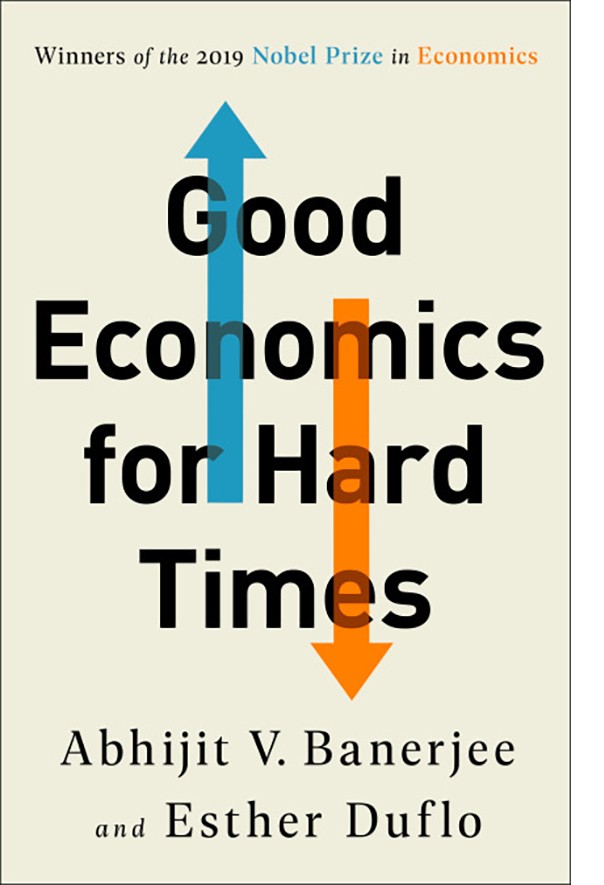How economics can help

Economists, on the whole, favor open immigration and free trade, which they regard as catalysts for growth. But many people in the US and Europe fear that immigration will cost them jobs or depress wages, and they believe free trade pushes industry abroad. So who’s right?
Both, according to MIT economists Esther Duflo, PhD ’99, and Abhijit Banerjee.
“If you look at the best evidence, it tells us that economists’ view of migration is more correct,” Duflo says: increased immigration does not affect wages, for instance. Yet “the evidence shows that people’s instinctive view of trade—that it does hurt them—has a lot that is true about it.” Although free trade boosts overall growth, it also produces concentrated pockets of job loss. And while theory has long held that workers will move to where the jobs are, this rarely happens.
In their second book, Good Economics for Hard Times (Public Affairs Press, 2019, $17), the MIT duo examines just such large-scale, politically fraught issues: not only immigration and trade but social identity, inequality, automation, and more. In each case, the book examines what empirical research can tell us about the world—and what we still don’t know. Only on that basis, they suggest, can we think effectively about economic policy.
Recent books from the MIT community
The Promise of Artificial Intelligence: Reckoning and Judgment
By Brian Cantwell Smith ’74, SM ’78, PhD ’82; MIT PRESS, 2019, $24.95
Benjamin Lax—Interviews on a Life in Physics at MIT: Understanding and Exploiting the Effects of Magnet Fields on Matter
By Donald T. Stevenson, PhD ’50, Marion B. Reine, PhD ’70, and Roshan L. Aggarwal CRC PRESS, 2019, $47.96
Find Your Path: Unconventional Lessons from 36 Leading Scientists and Engineers
By Daniel Goodman, PhD ’89; MIT PRESS, 2019, $19.95
Super Thinking: The Big Book of Mental Models
By Lauren McCann ’01, PhD ’06, and Gabriel Weinberg ’01, SM ’05; PORTFOLIO/PENGUIN, 2019, $29
On Trial for Reason: Science, Religion, and Culture in the Galileo Affair
By Maurice A. Finocchiaro ’64; OXFORD UNIVERSITY PRESS, 2019, $32.95
Saying No to Jugaad: The Making of BigBasket
By T. N. Hari and M. S. Subramanian, MEng ’09; BLOOMSBURY INDIA, 2019, $13.47
The Experience Economy: Competing for Customer Time, Attention, and Money
By B. Joseph Pine II, SM ’91, and James H. Gilmore; HARVARD BUSINESS REVIEW PRESS, 2020, $32
Send book news to MITNews@technologyreview.com or MIT News, 1 Main Street, 13th Floor Cambridge, MA 02142
In one chapter, for example, Banerjee and Duflo contend that ethnic or partisan identity is more flexible than is often assumed. This suggests that if people resist taxation because they believe the money will go to other groups, those views could be subject to change.
“It’s just not true that all federal and state spending goes to ‘other’ people,” Banerjee says. “There’s a lot of polarization that was created by such lies, and while we won’t fix these prejudices in a day, I do think it’s worth pushing back.”
Many of the interventions they find most promising are those that aid people in transitions such as job loss. “We need to act on this collectively,” Banerjee says. “You aren’t a failure because you lost your job. This is a transition. It’s society’s problem rather than only yours.”
To this end, Banerjee and Duflo favor the “somewhat radical idea” of subsidizing firms affected by trade. A robust effort to do this, they write, would help “prevent communities from falling apart.” But they are skeptical of proposals for a universal basic income. As Duflo says, “People don’t want just money. They want dignity.”
The authors also favor support for “labor--intensive public services” such as education and elder care. Crucially, these kinds of jobs are unlikely to be replaced by technology or outsourced to another country. In all cases, they write, the goal of social policy is to “help people absorb the shocks that affect them without allowing those shocks to affect their sense of themselves.”
“We clearly don’t have all the solutions, and suspect that nobody else does either,” they note. “We have much more to learn. But as long as we understand what the goal is, we can win.”
Keep Reading
Most Popular
Large language models can do jaw-dropping things. But nobody knows exactly why.
And that's a problem. Figuring it out is one of the biggest scientific puzzles of our time and a crucial step towards controlling more powerful future models.
The problem with plug-in hybrids? Their drivers.
Plug-in hybrids are often sold as a transition to EVs, but new data from Europe shows we’re still underestimating the emissions they produce.
Google DeepMind’s new generative model makes Super Mario–like games from scratch
Genie learns how to control games by watching hours and hours of video. It could help train next-gen robots too.
How scientists traced a mysterious covid case back to six toilets
When wastewater surveillance turns into a hunt for a single infected individual, the ethics get tricky.
Stay connected
Get the latest updates from
MIT Technology Review
Discover special offers, top stories, upcoming events, and more.